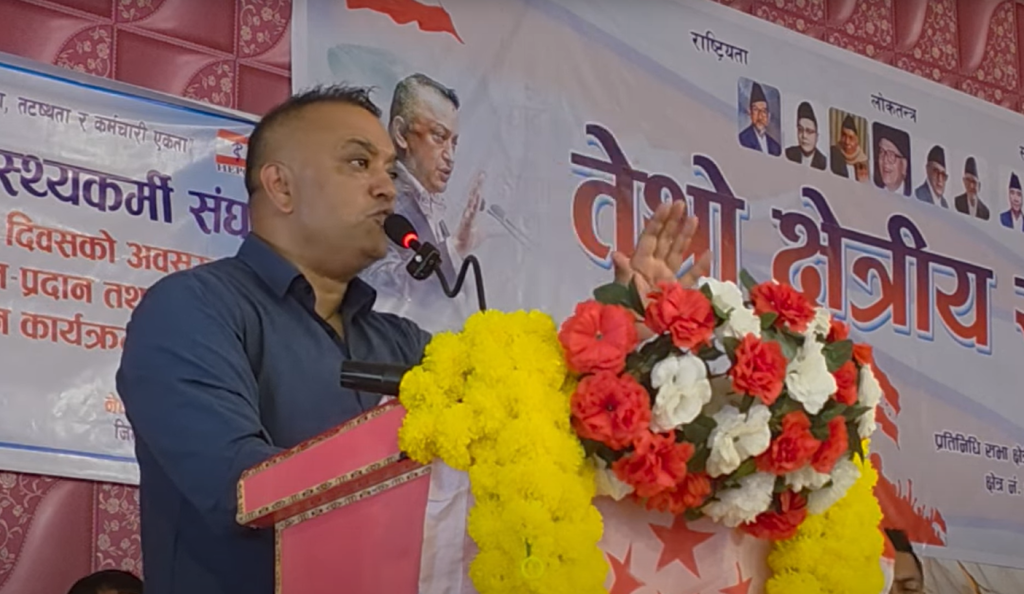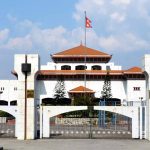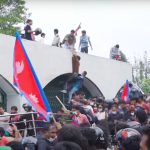
Nepali Congress General Secretary Gagan Thapa finds himself under immense pressure from both inside and outside the party.
On one side, the party establishment accuses him of rebelling against the leadership. On the other, society and Congress sympathizers are urging him to dismantle the old structure and bring in fresh leadership. Some well-wishers have even gone so far as to openly tell him, “Either replace the old guard or form a new party.”
After party president Sher Bahadur Deuba was injured during protests on September 9 and admitted to hospital, the establishment camp accused Thapa of exploiting the situation by raising the issue of leadership change. In this atmosphere, Thapa has made the demand for a special convention his main political agenda, supported by fellow General Secretary Bishwo Prakash Sharma.
Analysts Call It a Make-or-Break Moment
Political analyst Professor Krishna Khanal argues that the Congress must now be taken over by the two young general secretaries if it is to survive. According to him, continuing under Deuba’s leadership would “finish the party.”
“Gagan and Bishwo’s steps are natural and necessary. Deuba must either step aside to save the party or risk destroying it,” Khanal said.
Khanal highlighted Congress’s long history, contribution to democracy, and credibility among the people. He stressed that Deuba has only two options left: either safeguard the party’s future by withdrawing or preside over its downfall.
Thapa’s Political Roots
Unlike many traditional leaders, Gagan Thapa’s political journey began with street protests and social struggles—not with patronage. His leadership style, rooted in movements and activism, has attracted a new generation of Congress supporters toward him and Sharma.
However, the establishment portrays Thapa as an overly ambitious leader seeking power for himself. They argue that his push for a special convention is a calculated bid to become party president. Thapa denies this, insisting he is ready to pay any price to reform the party’s leadership, structure, and working style.
“Our system promoted corruption, and today’s generation is angry about it. Congress must change its thinking, its leadership, and its style,” Thapa told Kantipur. “I am ready to work as an ordinary member if needed. This is about reform, not personal ambition.”
A Test of Leadership After the Gen-G Movement
Analyst Geja Sharma Wagle said that after the Gen-G movement reshaped Nepali politics, Thapa and Sharma have been handed another opportunity to reorganize and transform Congress.
“This is their final test. If they fail again, there will be no second chance,” Wagle said.
He added that the upcoming special convention could become a platform for visionary, clean, and popular leadership that can realign the party with the aspirations of the younger generation.
Pressure and Questions from Within
Thapa and Sharma have often been branded as “permanent opposition” or “social media leaders” for their outspoken criticism of corruption and mismanagement in both parliament and the streets. Since the 13th General Convention, they have pushed for the replacement of the old leadership. Sharma has publicly opposed Deuba’s premiership since the 2022 general election.
Yet the establishment questions their timing: Why support Deuba as future prime minister until September 4, but then demand his removal immediately after the protests? Why push for a special convention while the president is still recovering from a violent attack? Critics accuse the duo of being insensitive and divisive at a time when unity is needed.
Thapa responds firmly:
“Nepal before September 8 and after September 9 is not the same. We cannot continue as if nothing changed. We asked the president to reform. If he refuses, we must move forward—there is no other way.”
Echoes of History
Khanal draws parallels with 1951 (2008 BS), when Nepali Congress removed Matrika Prasad Koirala despite his position as prime minister and revolutionary leader.
“If the party could move forward by sidelining Matrika, it can do the same with Deuba. If he doesn’t step down voluntarily, he must be removed through a special convention—or by mass movements, just as the Gen-G protests toppled two governments,” Khanal remarked.
Wagle also argued that Deuba should take moral responsibility for failure and resign. He believes the special convention must not only elect new leadership but also restructure the party fundamentally to adopt new ideas, policies, and philosophies suited to the changed context.
A Defining Moment for Gagan Thapa
For Thapa, this is a decisive crossroad. Will he push the Congress toward meaningful reform—or will internal resistance force him to consider an alternative political path?
Khanal warns:
“To save the relevance of the Congress, every risk must be taken. If Deuba does not step aside, he must be removed—even if it means taking the risk of confrontation.”
The coming weeks may determine whether Gagan Thapa reshapes the Nepali Congress—or risks his political future trying.










